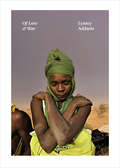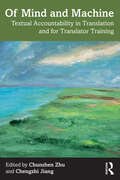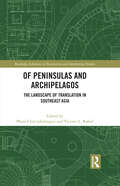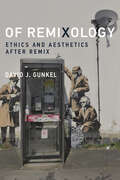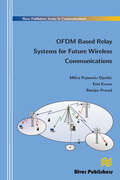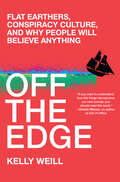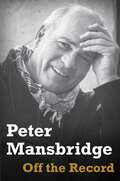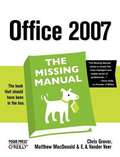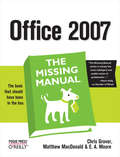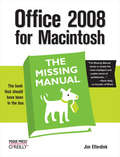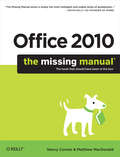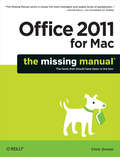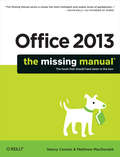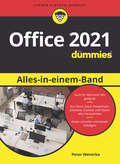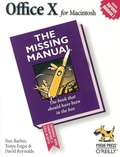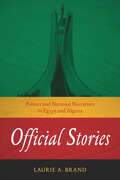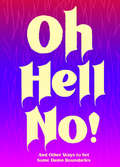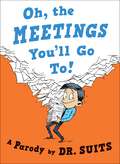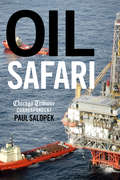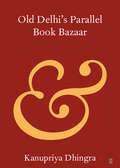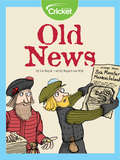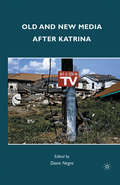- Table View
- List View
Of Love & War: A Photographer's Life Of Love And War
by Lynsey AddarioFrom the Pulitzer Prize-winning photojournalist and New York Times bestselling author, a stunning and personally curated selection of her work across the Middle East, South Asia, and AfricaPulitzer Prize–winning photojournalist and MacArthur Fellow Lynsey Addario has spent the last two decades bearing witness to the world’s most urgent humanitarian and human rights crises. Traveling to the most dangerous and remote corners to document crucial moments such as Afghanistan under the Taliban immediately before and after the 9/11 attacks, Iraq following the US-led invasion and dismantlement of Saddam Hussein’s government, and western Sudan in the aftermath of the genocide in Darfur, she has captured through her photographs visual testimony not only of war and injustice but also of humanity, dignity, and resilience. In this compelling collection of more than two hundred photographs, Addario’s commitment to exposing the devastating consequences of human conflict is on full display. Her subjects include the lives of female members of the military, as well as the trauma and abuse inflicted on women in male-dominated societies; American soldiers rescuing comrades in the Korengal Valley of Afghanistan, and Libyan opposition troops trading fire in Benghazi. Interspersed between her commanding and arresting images are personal journal entries and letters, as well as revelatory essays from esteemed writers such as Dexter Filkins, Suzy Hansen, and Lydia Polgreen. A powerful and singular work from one of the most brilliant and influential photojournalists working today, Of Love & War is a breathtaking record of our complex world in all its inescapable chaos, conflict, and beauty.
Of Mind and Machine: Textual Accountability in Translation and for Translator Training
by Chengzhi Jiang Chunshen ZhuOf Mind and Machine provides a broad perspective on multi-level dialogic engagements between text and reader as seen from the use of language in presenting information to generate a discursive experience in various sociocultural settings.The book observes contexts such as national literature in translation, diplomatic speech events, visual-verbal inter-semiotic translation, second language learning, interpreter training, and computer-aided teaching of translation and bilingual writing. These present a unifying interest in textual accountability between form, function, and effect that has been examined from a dual perspective of rhetoric and pragmatics. The research embodies a significant prospect of integration of academic originality with technological innovation to advance language education in the present digital era. Theoretically well-founded, the book does not confine itself to a self-contained system of conceptions and methods. Instead, it demonstrates a rich variety of research possibilities in support of theorisation and education in the field of language and translation studies.This edited volume is primarily intended for advanced undergraduates, postgraduates, researchers, and teachers within the fields of language and translation, applied linguistics, and discourse analysis.
Of Peninsulas and Archipelagos: The Landscape of Translation in Southeast Asia (Routledge Advances in Translation and Interpreting Studies)
by Vicente L. Rafael Phrae ChittiphalangsriComprising 11 countries and hundreds of languages from one of the most culturally diverse regions in the world, the chapters in this collection explore a wide range of translation issues. The subject of this volume is set in the contrasted landscapes of mainland peninsulas and maritime archipelagos in Southeast Asia, which, whilst remaining a largely minor area in Asian studies, harbors a wealth of textual heritage that opens to inquiries and new readings. From the post-Angkor Cambodia, the post-colonial Viantiane, to the ultra-modern Singapore metropolis, translation figures problematically in the modernization of indigenous literatures, criss-crossing chronologically and spatially through different literary landscapes. The peninsular geo-body gives rise to the politics of singularity as seen in the case of the predominant monolingual culture in Thailand, whereas the archipelagic geography such as the thousand islands of Indonesia allows for peculiar types of communication. Translation can also be metaphorized poetically to configure the transference in different scenarios such as the cases of self-translation in Philippine protest poetry and untranslatability in Vietnamese diasporic writings. The collection also includes intra-regional comparative views on historical and religious terms. This book will appeal to scholars and postgraduate students of translation studies, sociolinguistics, and Southeast Asian studies.
Of Remixology: Ethics and Aesthetics after Remix
by David J. GunkelA new theory of moral and aesthetic value for the age of remix, going beyond the usual debates over originality and appropriation.Remix—or the practice of recombining preexisting content—has proliferated across media both digital and analog. Fans celebrate it as a revolutionary new creative practice; critics characterize it as a lazy and cheap (and often illegal) recycling of other people's work. In Of Remixology, David Gunkel argues that to understand remix, we need to change the terms of the debate. The two sides of the remix controversy, Gunkel contends, share certain underlying values—originality, innovation, artistic integrity. And each side seeks to protect these values from the threat that is represented by the other. In reevaluating these shared philosophical assumptions, Gunkel not only provides a new way to understand remix, he also offers an innovative theory of moral and aesthetic value for the twenty-first century.In a section called “Premix,” Gunkel examines the terminology of remix (including “collage,” “sample,” “bootleg,” and “mashup”) and its material preconditions, the technology of recording. In “Remix,” he takes on the distinction between original and copy; makes a case for repetition; and considers the question of authorship in a world of seemingly endless recompiled and repurposed content. Finally, in “Postmix,” Gunkel outlines a new theory of moral and aesthetic value that can accommodate remix and its cultural significance, remixing—or reconfiguring and recombining—traditional philosophical approaches in the process.
Ofdm Based Relay Systems for Future Wireless Communications (River Publishers Series In Communications Ser.)
by Ramjee Prasad Milica Pejanovic-Djurisic Enis KocanRelay systems have become a subject of intensive research interest over the recent years, as it is recognized that they can improve performances and extend the coverage area of wireless communication systems. Special attention has been dedicated to them since the proposal appeared for their implementation in mobile cellular systems. Numerous researches conducted after that proposal have enabled incorporation of OFDM based relay systems in both accepted standards for IMT-Advanced systems. Nowadays, researches are ongoing with the aim to define new solutions for performance improvement of the standardized OFDM relay systems for cellular networks and one of the interesting solutions is implementation of subcarrier permutation (SCP) at the relay (R) station.The book OFDM based relay systems for future wireless communications presents a comprehensive research results in analyzing behavior and performance of the OFDM based relay systems with SCP. Dual-hop relay scenario with three communication terminals, and no direct link between the source (S) and the destination (D) has been analyzed, as it is compliant with the accepted solutions for IMT-Advanced systems. The book includes performance analysis and performance comparison of OFDM based:• amplify-and-forward (AF) relay systems with fixed gain (FG),• amplify-and-forward (AF) relay systems with variable gain (VG),• decode-and-forward (DF) relay systems,each including two SCP schemes, known to maximize the system capacity and/or improve the bit error rate (BER) performances. Performance comparisons have enabled definition of optimal solutions for the future wireless communication systems in a given conditions, and for the given optimality criteria. OFDM based relay systems for future wireless communications contains recent research results in this area and is ideal for the academic staff and master/research students in area of mobile communication systems, as well as for the personnel in communication industry.
Off the Edge: Flat Earthers, Conspiracy Culture, and Why People Will Believe Anything
by Kelly Weill&“A deep dive into the world of Flat Earth conspiracy theorists . . . that brilliantly reveals how people fall into illogical beliefs, reject reason, destroy relationships, and connect with a broad range of conspiracy theories in the social media age. Beautiful, probing, and often empathetic . . . An insightful, human look at what fuels conspiracy theories.&” —Science Since 2015, there has been a spectacular boom in a centuries-old delusion: that the earth is flat. More and more people believe that we all live on a pancake-shaped planet, capped by a solid dome and ringed by an impossible wall of ice. How? Why? In Off the Edge, journalist Kelly Weill draws a direct line from today&’s conspiratorial moment, brimming not just with Flat Earthers but also anti-vaxxers and QAnon followers, back to the early days of Flat Earth theory in the 1830s. We learn the natural impulses behind these beliefs: when faced with a complicated world out of our control, humans have always sought patterns to explain the inexplicable. This psychology doesn&’t change. But with the dawn of the twenty-first century, something else has shifted. Powered by Facebook and YouTube algorithms, the Flat Earth movement is growing. At once a definitive history of the movement and an essential look at its unbelievable present, Off the Edge introduces us to a cast of larger-than-life characters. We meet historical figures like the nineteenth-century grifter who first popularized the theory, as well as the many modern-day Flat Earthers Weill herself gets to know, from moms on vacation to determined creationists to neo-Nazi rappers. We discover what, and who, converts people to Flat Earth belief, and what happens inside the rabbit hole. And we even meet a man determined to fly into space in a homemade rocket-powered balloon—whose tragic death is as senseless and absurd as the theory he sets out to prove. In this incisive and powerful story about belief, Kelly Weill explores how we arrived at this moment of polarized realities and explains what needs to happen so that we might all return to the same spinning globe.
Off the Record
by Peter MansbridgePeter Mansbridge invites us to walk the beat with him in this entertaining and revealing look into his life and career, from his early broadcasting days in the remote northern Manitoba community of Churchill to the fast-paced news desk of CBC&’s flagship show, The National, where he reported on stories from around the world.Today, Peter Mansbridge is often recognized for his distinctive deep voice, which calmly delivered the news for over fifty years. But ironically, he never considered becoming a broadcaster. In some ways, though, Peter was prepared for a life as a newscaster from an early age. Every night around the dinner table, his family would debate the news of the day, from Cold War scandals and Vietnam to Elvis Presley and the Beatles. So in 1968, when by chance a CBC radio manager in Churchill, Manitoba, offered him a spot hosting the local late night music program, Peter embraced the opportunity. Without a teacher, he tuned into broadcasts from across Canada, the US, and the UK to learn the basic skills of a journalist and he eventually parlayed his position into his first news job. Less than twenty years later, he became the chief correspondent and anchor of The National. With humour and heart, Peter shares never-before-told stories from his distinguished career, including reporting on the fall of the Berlin Wall and the horror of 9/11, walking the beaches of Normandy with Tom Brokaw, and talking with Canadian prime ministers from John Diefenbaker to Justin Trudeau. But it&’s far from all serious. Peter also writes about finding the &“cure&” for baldness in China and landing the role of Peter Moosebridge in Disney&’s Zootopia. From the first (and only) time he was late to broadcast to his poignant interview with the late Gord Downie, these are the moments that have stuck with him. After years of interviewing others, Peter turns the lens on himself and takes us behind the scenes of his life on the frontlines of journalism as he reflects on the toll of being in the spotlight, the importance of diversity in the newsroom, the role of the media then and now, and the responsibilities we all bear as citizens in an increasingly global world.
Office 2007: The Missing Manual
by Matthew Macdonald Chris Grover E. A. Vander VeerQuickly learn the most useful features of Microsoft Office 2007 with our easy to read four-in-one guide. This fast-paced book gives you the basics of Word, Excel, PowerPoint and Access so you can start using the new versions of these major Office applications right away. Unlike every previous version, Office 2007 offers a completely redesigned user interface for each program. Microsoft has replaced the familiar menus with a new tabbed toolbar (or "ribbon"), and added other features such as "live preview" that lets you see exactly what each option will look like in the document before you choose it. This is good news for longtime users who never knew about some amazing Office features because they were hidden among cluttered and outdated menus. Adapting to the new format is going to be a shock -- especially if you're a longtime user. That's where Office 2007: The Missing Manual comes in. Rather than present a lot of arcane detail, this quick and friendly primer teaches you how to work with the most-used Office features, with four separate sections covering the four programs. The book offers a walkthrough of Microsoft's redesigned Office user interface before taking you through the basics of creating text documents, spreadsheets, presentations, and databases with: Clear explanations Step-by-step instructions Lots of illustrations Plenty of friendly advice It's a great way to master all 4 programs without having to stock up on a shelf-load of different books. This book has everything you need to get you up to speed fast. Office 2007: The Missing Manual is truly the book that should have been in the box.
Office 2007: The Missing Manual (The\missing Manual Ser.)
by Chris Grover E. A. Vander Veer Matthew MacDonaldQuickly learn the most useful features of Microsoft Office 2007 with our easy to read four-in-one guide. This fast-paced book gives you the basics of Word, Excel, PowerPoint and Access so you can start using the new versions of these major Office applications right away.Unlike every previous version, Office 2007 offers a completely redesigned user interface for each program. Microsoft has replaced the familiar menus with a new tabbed toolbar (or "ribbon"), and added other features such as "live preview" that lets you see exactly what each option will look like in the document before you choose it. This is good news for longtime users who never knew about some amazing Office features because they were hidden among cluttered and outdated menus.Adapting to the new format is going to be a shock -- especially if you're a longtime user. That's where Office 2007: The Missing Manual comes in. Rather than present a lot of arcane detail, this quick & friendly primer teaches you how to work with the most-used Office features, with four separate sections covering the four programs. The book offers a walkthrough of Microsoft's redesigned Office user interface before taking you through the basics of creating text documents, spreadsheets, presentations, and databases with:Clear explanationsStep-by-step instructionsLots of illustrationsPlenty of friendly adviceIt's a great way to master all 4 programs without having to stock up on a shelf-load of different books. This book has everything you need to get you up to speed fast. Office 2007: The Missing Manual is truly the book that should have been in the box.
Office 2008 for Macintosh: The Missing Manual
by Jim ElferdinkStill the top-selling software suite for Mac users, Microsoft Office has been improved and enhanced to take advantage of the latest Mac OS X features. You'll find lots of new features in Office 2008 for Word, Excel, PowerPoint and Entourage, but not a page of printed instructions to guide you through the changes. Office 2008 for Macintosh: The Missing Manual gives you the friendly, thorough introduction you need, whether you're a beginner who can't do more than point and click, or a power user who's ready to tackle a few advanced techniques.To cover Word, Excel, PowerPoint and Entourage, this guide gives you four superb books in one -- a separate section each for program! You can manage your day and create professional-looking documents, spreadsheets, and presentations in no time. Office 2008 has been redesigned so that the windows, toolbars, and icons blend in better with your other Mac applications. But there are still plenty of oddities. That's why this Missing Manual isn't shy about pointing out which features are gems in the rough -- and which are duds. With it, you'll learn how to:Navigate the new user interface with its bigger and more graphic toolbarsUse Word, Excel, PowerPoint, and Entourage separately or togetherKeep track of appointments and manage daily priorities with the My Day featureCreate newsletters, flyers, brochures, and more with Word's Publishing Layout ViewBuild financial documents like budgets and invoices with Excel's Ledger SheetsGet quick access to all document templates and graphics with the Elements GalleryOrganize all of your Office projects using Entourage's Project CenterScan or import digital camera images directly into any of the programsCustomize each program with power-user techniquesWith Office 2008 for Macintosh: The Missing Manual, you get objective and entertaining instruction to help you tap into all of the features of this powerful suite, so you can get more done in less time.
Office 2010: The Missing Manual (The\missing Manual Ser.)
by Nancy Conner Matthew MacDonaldMicrosoft Office is the most widely used software suite in the world. The half-dozen programs in Office 2010 are packed with amazing features, but most people just know the basics. This entertaining guide not only gets you started with Office, it reveals all kinds of useful things you didn't know the software could do -- with plenty of power-user tips and tricks when you're ready for more.Create professional-looking documents. Learn everything you need to know to craft beautiful Word documents.Stay organized. Keep track of your email, calendar, and contacts with Outlook.Crunch numbers with ease. Assemble data, make calculations, and summarize the results with Excel.Make eye-catching presentations. Build PowerPoint slideshows with video and audio clips, animations, and more.Build Access databases quickly. Make your data easy to find, sort, and manage.Manage your files more efficiently. Use the new Backstage view to quickly work with your Office files.Get to know the whole suite. Learn to use other handy Office tools: Publisher, OneNote, and Office Web Apps.
Office 2011 for Macintosh: The Missing Manual
by Chris GroverOffice 2011 for Mac is easy to use, but to unleash its full power, you need to go beyond the basics. This entertaining guide not only gets you started with Word, Excel, PowerPoint, and the new Outlook for Mac, it also reveals useful lots of things you didn't know the software could do. Get crystal-clear explanations on the features you use most -- and plenty of power-user tips when you're ready for more.Take advantage of new tools. Navigate with the Ribbon, use SmartArt graphics, and work online with Office Web Apps.Create professional-looking documents. Use Word to craft beautiful reports, newsletters, brochures, and posters.Crunch numbers with ease. Assemble data, make calculations, and summarize the results with Excel.Stay organized. Set up Outlook to track your email, contacts, appointments, and tasks.Make eye-catching presentations. Build PowerPoint slideshows with video and audio clips, animations, and other features.Use the programs together. Discover how to be more productive and creative by drawing directly in Word documents, adding spreadsheets to your slides, and more.
Office 2013: The Missing Manual (The\missing Manual Ser.)
by Nancy Conner Matthew MacDonaldMicrosoft Office is the most widely used productivity software in the world, but most people just know the basics. This helpful guide gets you started with the programs in Office 2013, and provides lots of power-user tips and tricks when you’re ready for more. You’ll learn about Office’s new templates and themes, touchscreen features, and other advances, including Excel’s Quick Analysis tool.The important stuff you need to know:Create professional-looking documents. Use Word to craft reports, newsletters, and brochures for the Web and desktop.Stay organized. Set up Outlook to track your email, contacts, appointments, and tasks.Work faster with Excel. Determine the best way to present your data with the new Quick Analysis tool.Make inspiring presentations. Build PowerPoint slideshows with video and audio clips, charts and graphs, and animations.Share your Access database. Design a custom database and let other people view it in their web browsers.Get to know the whole suite. Use other handy Office tools: Publisher, OneNote, and a full range of Office Web Apps.Create and share documents in the cloud. Upload and work with your Office files in Microsoft’s SkyDrive.
Office 2021 Alles-in-einem-Band für Dummies (Für Dummies)
by Peter WeverkaVerfassen Sie morgens einen Brief in Word, nehmen Sie vor dem Mittagessen an einer Microsoft-Teams-Besprechung teil, kneten Sie nachmittags Ihre Zahlen in Excel und beantworten Sie den ganzen Tag E-Mails in Outlook? Dieses Buch hilft Ihnen, all diese Aufgaben effizient zu bewältigen. Es bietet Anleitungen zu den wichtigsten Office-Anwendungen - Word, Excel, PowerPoint, Outlook - sowie zu den Tools, die die Zusammenarbeit mit Kollegen an anderen Standorten zum Kinderspiel machen: Microsoft Teams, OneDrive, SharePoint. Egal, ob Sie neu in Office sind oder nur eine Auffrischung für die neuesten Updates brauchen, dieses Buch beantwortet Ihre Fragen.
Office Procedures for the 21st Century (Eighth Edition)
by Sharon Burton Nelda SheltonThis market-leading book helps readers acquire the office and interpersonal skills needed to excel in any organization. Its proven approach means students acquire these skills quickly and chapters introduce a range of topics including file management, time management, employment skills, basic financial forms, problem solving, human relations and more! This edition features more on communication, references Microsoft Office 2007, and expands the office simulation to include both functional and cumulative exercises. New chapters address the medical and legal office and new assignments develop employer-ready skills. New! Updated content includes topics such as: Current office trends The green office Office politics e-Portfolios Displaying good manners Ordering supplies online Visitors and language barriers Complaining customers Steps for keying minutes Steps for PowerPoint 2007 and more!
Office X for Macintosh: The Missing Manual
by Nan Barber Tonya Engst David ReynoldsMac OS X, Apple's super-advanced, Unix-based operating system, offers every desirable system-software feature known to humans. But without a compatible software library, the Mac of the future was doomed. Microsoft Office X for Macintosh is exactly the software suite most Mac fans were waiting for. Its four programs--Word, Excel, PowerPoint, and Entourage--have been completely overhauled to take advantage of the stunning looks and rock-like stability of Mac OS X. But this magnificent package comes without a single page of printed instructions. Fortunately, Pogue Press/O'Reilly is once again there to rescue the befuddled and overwhelmed--with Office X for Macintosh: The Missing Manual . It tackles each of the primary Office applications with depth, humor, and clarity, and provides relief for the hapless Mac user who'd rather read professionally written printed instructions than hunt through a maze of dryly written help screens. Office X for Macintosh: The Missing Manual is coauthored by a dream team of Macintosh experts: Tonya Engst, coeditor of the popular TidBITS Macintosh newsletter; David Reynolds, former executive editor of MacAddict magazine (now working at Apple); and Nan Barber, Macworld contributor and coauthor of Office 2001 for Macintosh: The Missing Manual , on which this book is based. Once again, the authors are joined by series founder David Pogue, who has closely edited the book to ensure excellence of depth, accuracy, and prose.
Official Stories: Politics and National Narratives in Egypt and Algeria
by Laurie A. BrandUntil the recent uprisings in the Middle East and North Africa, the resilience of authoritarian regimes seemed a fundamental feature of regional politics. While economic, political, and internal security policies are most often considered in discussions of regime maintenance, Laurie Brand introduces a new factor, that of national narratives. Portrayals of a country's founding, identity, and bases of unity can be a powerful strategy in sustaining a ruling elite. Brand argues that such official stories, which are used to reinforce the right to rule, justify policies, or combat opponents, deserve careful exploration if we are to understand the full range of tools available to respond to crises that threaten a leadership's hold on power. Brand examines more than six decades of political, economic, and military challenges in two of North Africa's largest countries: Egypt and Algeria. Through a careful analysis of various texts—history and religion textbooks, constitutions, national charters, and presidential speeches—Official Stories demonstrates how leaderships have attempted to reconfigure narratives to confront challenges to their power. Brand's account also demonstrates how leaderships may miscalculate, thereby setting in motion opposition forces beyond their control.
Oh Hell No: And Other Ways to Set Some Damn Boundaries
by Chronicle BooksThere's a time for yes—and there's a time for no.Oh Hell No! is a collection of art and essays that serve a much-needed reminder to say no to anything that might waste our precious energy.Reclaim your time with the help of these sassy illustrated sayings and astute insights.• A timely celebration of the joy of saying no• Features passionate prose from feminist scholar Sara Ahmed• Includes actionable advice from author and journalist Dani KatzFrom polite refusal to emphatic rejection, we need that two letter word now more than ever.Oh Hell No! is a reminder and a celebration of the universal human right to say "I would prefer not to."• The ultimate naysayer's manifesto• The perfect self-purchase for feminists, introverts, activists, realists, or burned-out overachievers who are trying to say "no" more often• You'll love this book if you love books like The Subtle Art of Not Giving a F*ck: A Counterintuitive Approach to Living a Good Life by Mark Manson; Boundaries Updated and Expanded Edition: When to Say Yes, How to Say No To Take Control of Your Life by Henry Cloud and John Townsend; and F*ck Feelings: One Shrink's Practical Advice for Managing All Life's Impossible Problems by Michael Bennett MD and Sarah Bennett.
Oh, The Meetings You'll Go To!: A Parody
by Dr. SuitsEvery young grad needs this fun, snarky primer for the real world. You&’ll meet the world&’s brightest, you&’ll hang with the best! And now that you&’ve met them, you&’ll work with the rest! If you&’re looking for an inspirational book for young people starting life&’s great adventure, you probably want to read Dr. Seuss&’s Oh, the Places You&’ll Go! But before your first day of actual work, you need to meet Dr. Suits for a dose of reality. You won&’t learn this stuff in high school, college, or gift books by world-famous authors. But fear not! With his unique blend of hilarious verse and images, Dr. Suits can help young grads get a handle on what&’s really about to hit them. Oh, the Meetings You&’ll Go To! is a brutally honest, and ultimately uplifting, take on the struggles of post-grad life that every 20-something will relate to. Tough love never made you laugh so hard.
Oil Safari
by Paul F. SalopekWould Americans pay more attention to their sources of petroleum-the lifeblood of their car-centric society-if gasoline came with a price tag tallying the explicit human costs of each fill-up? What untold stories of war, poverty and corruption get burned up and expelled from millions of U.S. tailpipes every day? And do false industry assurances that fuel can never be traced from local service stations back to its origins in troubled foreign oil patches help absolve us of responsibility for the wages of our energy addiction?Two-time Pulitzer Prize-winning journalist Paul F. Salopek, a Chicago Tribune foreign correspondent, tackles these questions that are at the heart of Oil Safari: In Search of the Source of America's Fuel. Taken from Salopek's four-part narrative travelogue published in 2006, this book debunks the well-tended industry myth that global oil flows are too complex and fungible to tease apart at a retail outlet.Salopek describes the gripping stories of a diverse cast of characters who are touched by a typical shipment of oil that ends up in the U.S. There is the oil rig worker in the Gulf of Mexico, an Iraqi security consultant, a Nigerian fisherman whose homeland is threatened by drilling, and an indigenous Venezuelan elder who benefits from the country's oil reserves (which are used to fund social programs).Energy policy is at the heart of American politics now more than ever, between the troubling aftermath of the BP Deepwater Horizon oil spill, the burgeoning American surplus of natural gas, and the Obama administration's continued emphasis on renewable energy sources. Oil Safari brings human narratives to the foreground of our energy policy debates and own personal consumption habits.
Old Books, New Technologies
by David MckitterickAs we rely increasingly on digital resources, and libraries discard large parts of their older collections, what is our responsibility to preserve 'old books' for the future? David McKitterick's lively and wide-ranging study explores how old books have been represented and interpreted from the eighteenth century to the present day. Conservation of these texts has taken many forms, from early methods of counterfeiting, imitation and rebinding to modern practices of microfilming, digitisation and photography. Using a comprehensive range of examples, McKitterick reveals these practices and their effects to address wider questions surrounding the value of printed books, both in terms of their content and their status as historical objects. Creating a link between historical approaches and the technologies of the future, this book furthers our understanding of old books and their significance in a world of emerging digital technology.
Old Delhi's Parallel Book Bazaar (Elements in Publishing and Book Culture)
by Kanupriya DhingraThis Element looks at Old Delhi's Daryaganj Sunday Book Market, popularly known as Daryaganj Sunday Patri Kitab Bazaar, as a parallel location for books and a site of resilience and possibilities. The first section studies the bazaar's spatiality - its location, relocation, and respatialisation. Three actors play a major role in creating and organising this spatiality: the sellers, the buyers, and the civic authorities. The second section narrativizes the biographies of the booksellers of Daryaganj to offer a map of the hidden social and material networks that support the informal modes of bookselling. Amidst order and chaos, using their specialised knowledge, Daryaganj booksellers create distinctive mechanisms to serve the diverse reading public of Delhi. Using ethnography, oral interviews, and rhythmanalysis, this Element tells a story of urban aspirations, state-citizen relations, official and unofficial cultural economies, and imaginations of other viable worlds of being and believing.
Old English Metre
by Jun TerasawaOld English Metre offers an essential framework for the critical analysis of metrical structures and interpretations in Old English literature. Jun Terasawa's comprehensive introductory text covers the basics of Old English metre and reviews the current research in the field, emphasizing the interaction between Old English metre and components such as word-formation, word-choice, and grammar. He also covers the metre-related problems of dating, authorship, and the distinction between prose and verse.Each chapter includes exercises and suggestions for further reading. Appendices provide possible answers to the exercises, tips for scanning half-lines, and brief definitions of metrical terms used. Examples in Old English are provided with literal modern English translations, with glosses added in the first three chapters to help beginners. The result is a comprehensive guide that makes important text-critical skills much more readily available to Old English specialists and beginners alike.
Old News
by Liz HuyckPeople have always liked to know what's going on in the outside world. Today we can instantly access the news through the Internet. But how did people get the news before cell phones and TV? From ancient Rome to newspapers and telegraph machines, this story takes a brief look at how people have gotten the news throughout history.
Old and New Media after Katrina
by Diane NegraOn the fifth anniversary of Hurricane Katrina, this book examines the television coverage of September, 2005, and the manifestation of its legacy in a range of other media forms.
